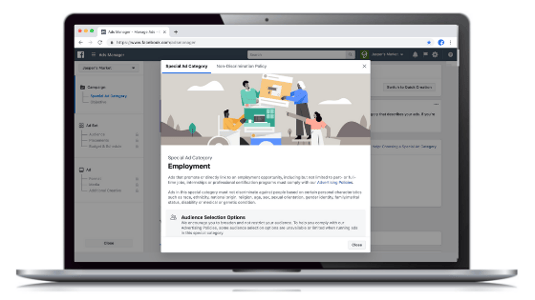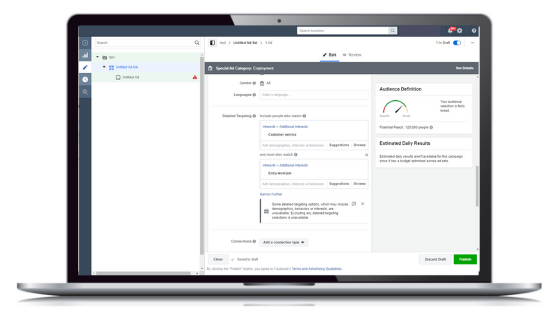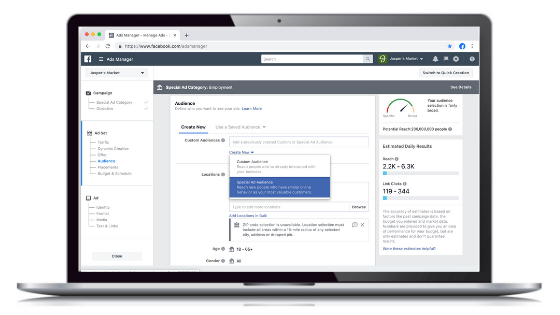Facebook has long been the leader of targeted social media ads, a recognition earned by the platform’s superior targeting capabilities. When it came to targeting job seekers, the possibilities were nearly endless, with never-ending options for job titles, industries, employers, and fields of study. It was easy for recruitment advertisers to hone in their targeting in order to reach the perfect potential candidates. For many years, the robust targeting abilities on Facebook’s platform also came with an unregulated ability to exclude categories of individuals.
The detrimental effects of exclusion-based targeting came to light through an in-depth investigation released by ProPublica, which specifically scrutinized the exclusion of age-related audiences from employment based ads. Their study found that dozens of America’s leading employers were limiting the target audiences in their campaigns to exclude certain age groups. Other investigations found similar instances of discrimination regarding the exclusion of certain races and genders. In return, several class action lawsuits were brought against the platform citing that Facebook’s exclusion capabilities broke the protections guarding job seekers as defined in The Civil Rights Act of 1964.
In March 2019 Sheryl Sandberg, Chief Operating Officer at Facebook, announced that Facebook had reached several settlements with civil rights organizations. Sheryl stated, “There is a long history of discrimination in the areas of housing, employment, and credit, and this harmful behavior should not happen through Facebook ads” (Facebook 2019). As a result, Facebook has updated their advertising policies and taken major steps to protect Facebook users from discrimination.
What Does This Mean for Employment Ads?
This summer, Facebook has rolled out a new segment called “Special Ad Category” within Ads Manager specifically for ads pertaining to employment, housing, and credit. This update will have a significant impact on the employment related ads recruitment advertisers are running today. It’s important to be aware of these changes and examine your social recruiting strategy to ensure that your Facebook campaigns will continue to drive a strong ROI.

Under this new policy, all U.S. based advertisers running employment related ads must self-identify and confirm that their content relates to the new Special Ad Category. Any campaigns that meet this criteria and forgo following this new policy could be disapproved and have their delivery halted. This policy will be enforced as of August 26, 2019.
What Does This Mean for Targeting?
The targeting available to those running ads in this special category is quite different from the expansive interface advertisers are used to. The primary goal of these changes is to remove the ability to discriminate. In doing so, one of the biggest changes is the removal of exclusion capabilities. Here’s a full list of the changes to targeting, according to Facebook:
1- Removed ability to target by: Age, Gender, and Zip Code
Targeting related to protected classes such as age, gender, and zip code are no longer available to advertisers sponsoring content within this category in the United States. All employment related ads are shown to all ages and all genders.
2- Substantially reduced available Interest targeting options
To reduce the potential for discrimination against protected classes within the microtargeting options on the platform, Facebook has created a list of approximately 250 categorical interests related to employment, housing, and credit. The ability to target by job title, industry, educational level, field of study, and employer have been removed.
What does this look like for recruitment advertisers? The scope of Interest targeting levels is far more general than was previously allowed. For example, if targeting a Retail position: Instead of being able to target “Cashiers” and “Sales Assistants” job titles who have an interest in the “Retail” industry, advertisers will now have to utilize targeting such as “Customer Service” and “Sales” interests.
3- Removed ability to exclude Interests from targeting
While advertisers can still create “and must also” statements within their targeting, the ability to exclude any groups is now prohibited within employment ads.

What does this look like? For example, while advertisers can still create targeting of those with an interest in “Customer Service” and must also have an interest in “Entry-level job,” they can no longer create targeting of those with an interest in “Customer Service” and exclude an interest in “Management.”
4- Updated location targeting
In addition to the removal of zip code targeting, advertisers must also utilize a radius of at least 15+ miles around any city or pin drop in their employment related campaigns. This new policy helps to remove the ability to target based on a neighborhood’s socioeconomic status. Remember that advertisers cannot exclude any locations from their targeting.
5- Changes to Lookalike Audiences

Advertisers will have to create Special Ad Audiences, which are lookalike audiences that do utilize characteristics of protected classes when creating the list of individuals. These include the items noted above: age, gender, zip code, race, and national origin, among others.
How to Utilize Facebook Ads for Recruitment Moving Forward?
While Facebook took necessary action on their platform to protect both job seekers from discrimination and employers from culpability, it will have a critical effect on the ability to directly hone in on the right candidate for the job. Being able to target senior software developers or registered nurses who have the necessary experience will be difficult. Recruitment advertisers will need to think critically and create strategies for utilizing Facebook ads less as a targeted job campaign and more as a broader brand awareness approach.
In addition, these policy updates make it significantly more important to ensure that employers have a Facebook pixel placed on their career site in order to utilize data to create retargeting and lookalike audiences. By placing event pixels throughout each stage of the candidate funnel, advertisers can retarget website visitors who viewed jobs but did not complete an application. These audiences will be key to having strong social recruiting campaigns moving forward.
Ad creative will also have a larger impact on recruitment related performance and strategy. Trying to promote your diversity & inclusion hiring? Instead of targeting by these interests, create copy and graphics that showcase your diversity initiatives and drive candidates to landing pages that speak directly to your focus. Sponsor videos and content that speak to the facets of your organization you are trying to highlight; those candidates who resonate with your messaging will be the ones to engage with your ads and take further actions to apply.
Does this Update Affect Only the United States?
The Special Ad Category is related to any ads targeted within the United States, as well as any advertisers based in the United States. In more detail:
- U.S. advertisers targeting employment, housing, or credit ads to a U.S. based audience – MUST COMPLY.
- Advertisers based in the U.S. targeting an international audience related to employment, housing, or credit – MUST COMPLY.
- International advertisers targeting an employment, housing, or credit ad to the U.S. – MUST COMPLY.
- International advertisers targeting an employment, housing, or credit ad to a non-U.S. audience – NOT REQUIRED.
Further Reading About Special Ad Category Updates:
Facebook’s Employment, Housing, and Credit Ad Updates – Easy to Understand Guide
Step-by-Step Guide to Creating Ads within the Special Ad Category
Effects on U.S. and International Ads
Need help navigating these changes to employment related ads or interested in exploring a targeted ads strategy? Reach out to our team of recruitment marketing experts – we are here to help.
(Image Source: Facebook.com)
GET ACCESS TO THIS WEBINAR ON DEMAND
.png?width=480&name=the%20impact%20of%20covid%20on%20talent%20acquisition%20-%20sigstr%20(2).png)



